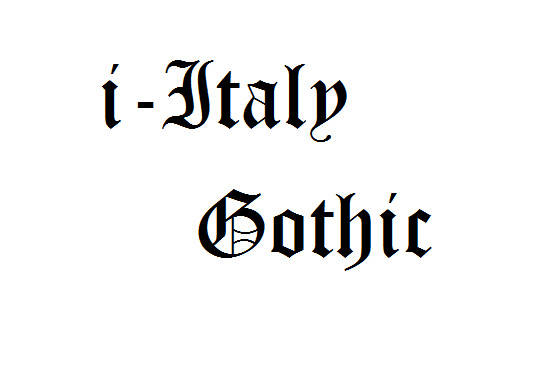Why Gothic? Why a Yank?
Gothic will draw on some earlier commentary that first appeared in the very distinguished, but short-lived, journal USItalia directed by Stefano Vaccara. We will update, re-think, and weed some of those pieces, and add others that seem apt for the moment, but the purpose will be the same: to develop a structure of understanding of the background, practices, code words and quirks of Italian politics --- a framework most people think they don’t need.
We, Italians and Americans, have the impression that the politics of the other country is clear and familiar. We both use the common vocabulary of Western politics. Italy has a parliament, parties, elections, a president, a prime minister (sometimes mysteriously called “President”), scandals and television debates. But, to our dismay, nothing works quite as one might expect. Italians read American articles on Italy and shake their heads: the facts may be accurate, but the sense of what’s important, what isn’t, and what it means, is usually not there. Our confidence in our understanding is misplaced. It ignores the fact that the familiar words and forms hide a political culture that is profoundly different from what Americans know, even if their family background is Italian, even if they have a good understanding of how the rest of Europe works. (Fact: one reason American newspaper editors run fewer stories about Italian politics than about those of the other big Western countries is that the stories from Italy are usually much longer. The few good correspondents reporting from Italy need more space to make an event or a situation coherent; cut it and it becomes nonsense.)
So why should a framework of understanding appear to be Gothic?
In a Gothic novel, the innocent heroine (that’s us) enters the mansion with an easy heart, only to find that things are not what they seem. Besides the locked closets and trap doors, there is history there. Ecco.
In Gothic architecture, things are not supposed to be what they seem. The flying buttress does not fly, or leap, as it appears to do, but is, despite appearances, a serious buttress for the whole structure. The keys to the entire structure may be hidden behind ornament and illusion. Ecco.
Frankly, we saw no reason to change the name Gothic. But we certainly do not intend to suggest that Italian politics is entirely dysfunctional (a widespread belief these days in Italy) or past-bound. The successes of the postwar Italian republic are singularly impressive. But the understanding of the workings of that politics is tricky, fascinating, and always highly provisional. Forget dietrologia --- the study of what lies behind --- for a while: reading the surface is difficult (and intoxicating) enough.
So, in weeks to come, we’ll explore such mysteries as:
---how to follow a political crisis;
---the personality phenomena: Berlusconi and Veltroni
---the relation between culture and politics;
---autobiography and intellectual integrity;
---how to read the political press;
---how the parties tried to use cinema;
---re-writing Communist Party history;
---north and south;
---the failure of the two churches (political Christianity and Marxism);
---the politics of terrorism;
---the geometry of convergent parallelism;
---the role of the U.S. embassy;
---the politics of the magistrates: Milan, Rome, Palermo, Catanzaro;
---what Craxi did to the Left…
Finally, let me anticipate a doubt that should be in your mind: the gap in political culture between Italy and other countries (see above) is so great that it’s generally a mistake to look for guidance from anybody but an Italian. Nevertheless, there are some exceptions to this good rule:
---George Trevelyan was such a brilliant story-teller that his three volumes on Garibaldi constitute one of the best reads on either side, fiction or non-fiction, of the library.
---The British historian Paul Ginsborg has a unique facility for tying Italian politics to Italian society and so has produced political histories rich in humane understand.
---The great Yale political scientist Joseph LaPalombara has written so cogently about Italian political institutions that political figures from Andreotti to Giuliano Amato have declared that they learned from him.
---As for me, well, one learns something from several decades of being wrong about Italian politics. For example, after some lunches a quatr’occhi with a Milan entrepreneur seeking Hollywood product for this television stations, I once reported to the Department of State that, aside from being a sincere anti-Communist, Silvio Berlusconi had no serious interest in politics.
With that kind of shrewd analysis on tap, we’ll begin our voyage of exploration/explanation next week.


































i-Italy
Facebook
Google+
This work may not be reproduced, in whole or in part, without prior written permission.
Questo lavoro non può essere riprodotto, in tutto o in parte, senza permesso scritto.